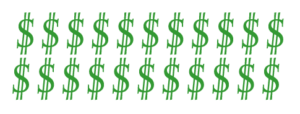
Affiliate marketing is your effort to get other websites to advertise your webbook. You pay them a fee for leads (click-throughs) or a commission for sales.
What do you have to do to be an affiliate marketer? That is, what do you have to do to get other websites to send you customers for your webbook?
First, you have to decide what your deal is going to be. The affiliate advertisers have to have an incentive to send their customers to you. It seems to me that a normal retail incentive might make sense. That is, you might offer a 50% commission on all sales for customers directed by an affiliate to your website. To be clear, we’re not talking about a click-through lead. We’re talking about a sale.
You have to have the software to handle the accounting for affiliates. The software must register each sale and credit affiliate accounts with the proper commission. Based on such accountings you will need to send checks, probably on a monthly basis. Off-the-shelf software is available.
On the other hand, if you don’t sell your webbook but instead provide free access, you will need to pay affiliate websites a fee for click-throughs (affiliate website users clicking on your ad-link on the affiliate website). This is a per-click-through cost, not a commission.
Second, you have to find affiliates. The easiest way to do it is to join an affiliate network group where your offer goes into the group’s database (catalog) making your ad immediately available to many internet business people and organizations that may choose to run your ad. (Note that an affiliate network typically handles the accounting for you.) That works, if you can find an affiliate group that will accept your ad offer.
Another way to do it is to just go out and recruit affiliates. A thorough search on the Internet will give you a list of potential websites that might be interested in selling your publishing products. Then contact the webmasters in each of those websites and make your offer to them. Some will accept and some won’t. The broader the appeal of your publishing products, the more potential affiliates you will have to contact. This is labor-intensive work.
Third, set up guidelines and criteria for people who will feature your ads on their websites to promote your book. You don’t want to have a lot of restrictions. Nonetheless, some restrictions might make sense. For instance, you may not want to have your ads published on somebody’s porn-site.
Finally, you want make it as easy as possible for your affiliates to run your ad. That means giving them proper HTML code, advertising copy, and graphics.
Traditionally publishers have made a business out of manufacturing books and selling them wholesale to retail bookstores. The difference on the web is that anyone can become a retail bookstore.
For example, it makes sense for somebody who has a website specializing in giraffes to also have a little online store for giraffe accessories. Such accessories might include T‑shirts, mugs baseball caps, and books. But even if such a website doesn’t have a store with accessories, it might have links to resources (e.g., a Resources page), which can include a link to your webbook about giraffes. What’s nice for the retailer is that they don’t have to do anything except place the code for your affiliate link into their webpage; and they collect a commission (that you pay) if a sale results or a click-through fee if there is no commission.
After all is said and done, your best bet for successful affiliate marketing is likely to be joining affiliate networks. It’s an easy and efficient way to market, and the networks do all the accounting for you. That an affiliate group has the credibility to do the accounting honestly is also a benefit to potential affiliates thereby encouraging greater effectiveness for your affiliate marketing program.
Confusion Undone
Don’t confuse affiliate marketing with affiliate advertising. In an affiliate marketing program, you seek to entice other websites to run your ads. Such ads have links that take users at other websites to your website (e.g., webbook) to buy or view what you have to offer.
In an affiliate advertising program, you run the ads of those who want to advertise on your website. The advertisers pay you to run their ads. Read Chapter 26.
Summary
If you establish an affiliate marketing program, where’s the benefit to you? The benefit is in what you sell or in the number of potential users you can get to your webbook. There may also be side benefits. For instance, you can make upsales in the traffic generated by your affiliate marketing.

The real benefit of an affiliate marketing program is getting others to sell your your publishing products, in effect.